The Mysterious Montague Summers
The Information and Reference Library store contains many interesting and eclectic books, but some of the most eye-catching are those written or edited by a Reverend Montague Summers. The more sedate selection concerns literature, specifically that of the 17th century poet laureates Dryden and Shadwell. These are not Summers only works, however; nor are they the most notable. For on another shelf are writings by the Reverend Montague Summers concerning his other interest: the supernatural.
It is largely this interest and the controversy surrounding it that led to Montague Summers becoming so well known. His first books on the occult were published in the late 1920s. By this time, rational and materialistic thought was already standard. Fervent belief in the supernatural – such as that professed by Summers – was strange enough to be notable and controversial.
His many books on the occult include not only those he wrote but also ones he edited. They have earned him mentions alongside the likes of occultist Aleister Crowley. These mentions contrast strongly with Summers’ reputation as a respected scholar of Restoration drama and Gothic literature. Montague Summers was certainly an unusual and fascinating man, and is of particular interest given his link to Richmond Borough libraries.
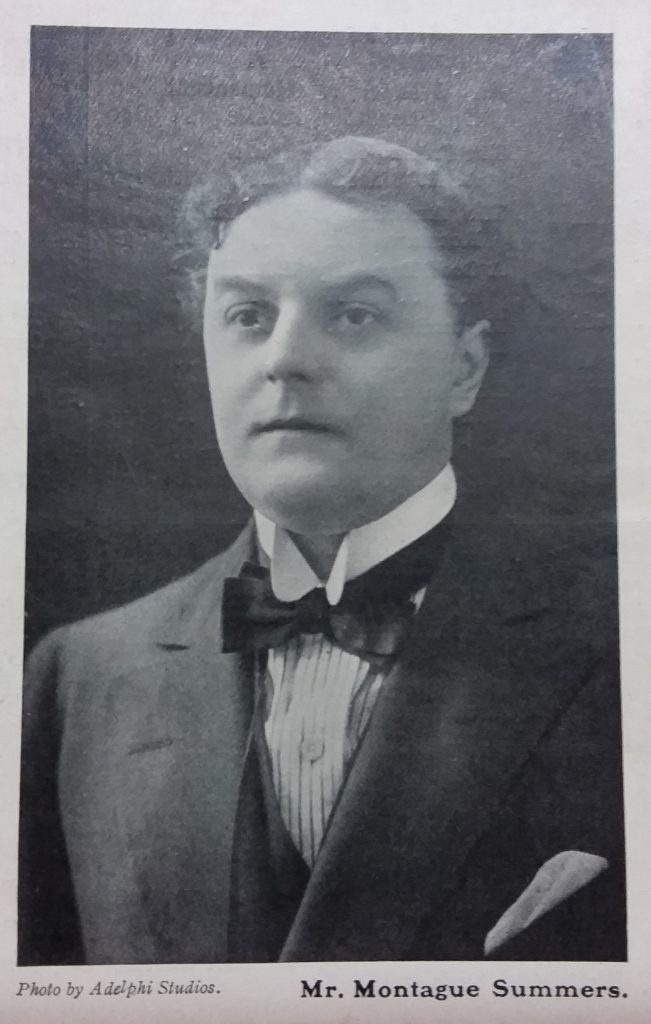 Religion
Religion
Born Augustus Montague Summers in Bristol in 1880, Montague Summers was well educated at Clifton college and Trinity College Oxford. He was ordained as a deacon in the Church of England at Lichfield Theological college in 1908. However, his belief in the literal existence of Satan and demonic forces led him to convert to Catholicism in 1909. After this he assumed several extra names and became known as Alphonsus Joseph-Mary Augustus Montague Summers.
He also began to refer to himself as Reverend, and to wear clothing typical of a Catholic priest. It is not known whether Montague Summers was ordained within the Catholic Church; he was certainly not ordained by any English Catholic seminary. It was suggested that he may have been ordained in Rome, possibly by a wayward Church official who would have been technically able to ordain priests – whether or not it was wise for them to do so.
However legitimate his title may have been, Reverend Alphonsus Joseph-Mary Augustus Montague Summers was certainly a very devout man. He believed firmly in the good of the Church and was staunchly opposed to atheism and reliance on rationality. Summers wrote articles on Saints (among other subjects) for Everybody’s Weekly in his later life, and also wrote more than one book on Saints.
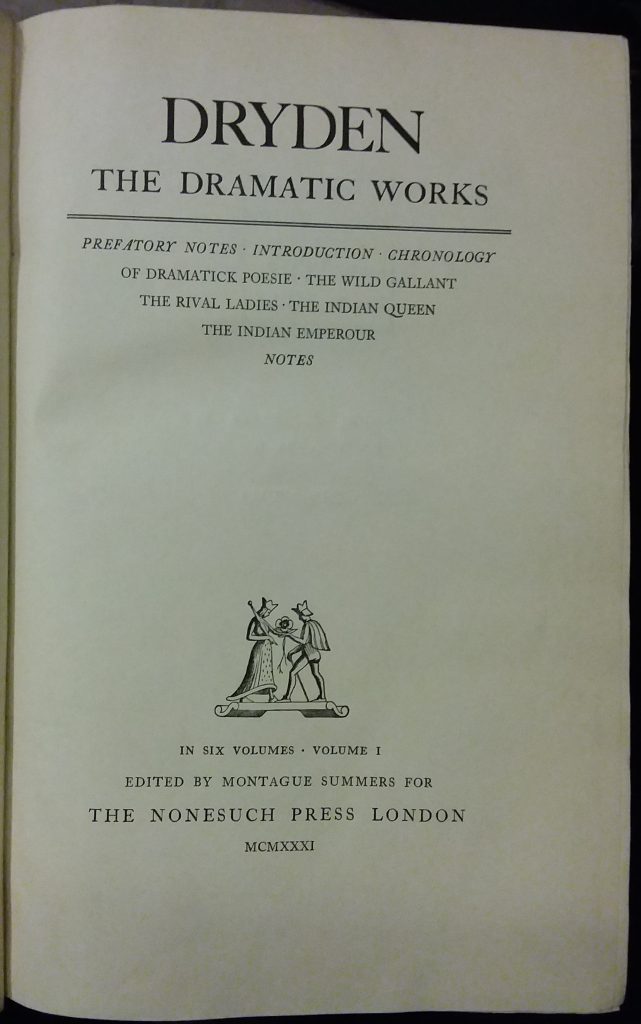
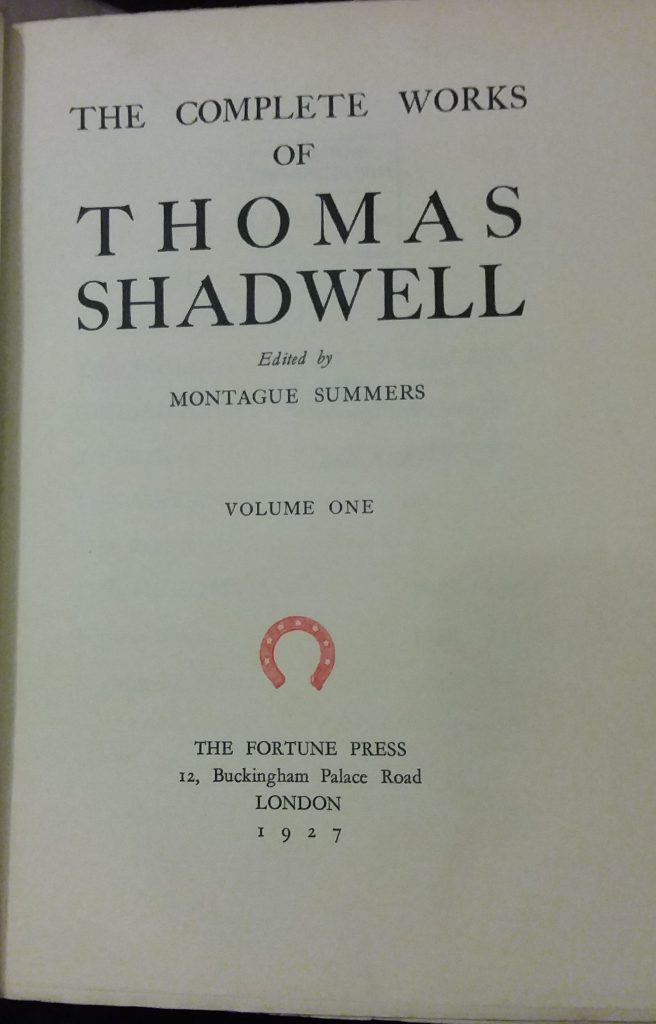
Scholar
Before his forays into the occult, Montague Summers was already known for his works on Restoration drama and Gothic literature. Summers has been credited in being a vital figure in the revival of interest in these topics, and was known for his extensive collection of gothic literature. He wrote A Bibliography of the Gothic Novel (1940), which despite some factual errors is still highly regarded.
He edited the Complete Works of Thomas Shadwell and Dryden, Dramatic Works, and wrote books on a number of other topics, including Jane Austen and Ann Radcliffe. Summers was a Senior English and Classics Master at Brockley County School until 1926 when he left to focus his writing. In 1919 he founded the Phoenix Society, dedicated to bringing forgotten plays back to the stage. Through this society he superintended the production of eighteen plays. He remained active after the Society was succeeded by the Renaissance Theatre. Summers was known for his remarkable contributions to literature and drama even after his later work threatened to overshadow his more conventional pursuits.
The Occult
“…he suddenly tore [the child] to pieces with his teeth, seeming to swallow down great gory gobbets of raw flesh. The crowd uttered hideous yells and hurled stones at the phantom, but this did not disappear until only the head of the child was left undevoured.”
Montague Summers, “The Vampire in Europe”
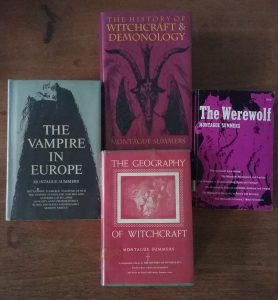
Having left his teaching position to write full time, Summers invested more time and effort in his other interests; namely the occult. He published his first book on the occult in 1926, titled The History of Witchcraft and Demonology. This was followed by many other works, including The Geography of Witchcraft (1927), Vampire: Kith and Kin (1928), and The Werewolf (1933). His books are known for their lurid descriptions, as well as Summers’ ability to take the most obscure of sources and spin it into a full account. Some of his claims appear to have been conjured out of thin air; the sources he used were either so obscure or obsolete that they cannot be found today.
Montague Summers didn’t just write his own books; he also translated and edited several collections. He cemented his place in the history of the occult when he provided the first English translation of the Malleus Maleficarum in 1928, the infamous manual often used by witch hunters during the trials of the 15th to 17th centuries. Summers also edited a series on The Church and Witchcraft which included translations of other occult works. Several of Summers’ works were banned and all copies ordered destroyed, including The Confessions of Madeleine Bavent and Demonolatry. Despite this, several copies of each survived and were fairly easy to find as late as the 1980s.
A true believer?
There is ongoing debate as to how far Montague Summers believed what he wrote in regards to the occult. Some point out that it was highly unusual for the time to truly believe in all that Summers’ wrote; indeed, when The History of Witchcraft and Demonology was published, H. G. Wells wrote a scathing attack on the book. Others regard the force of Summers’ prose and dedication to the occult to speak for itself. Summers’ himself certainly spoke often and with conviction about his beliefs, which he professed to be sincere.
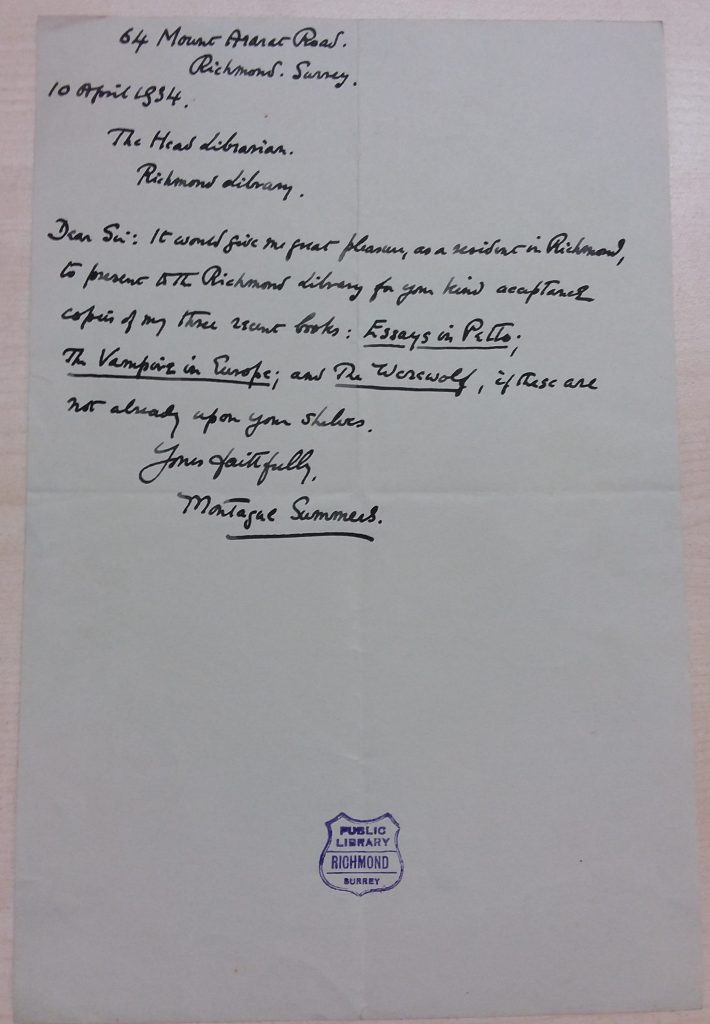
Richmond upon Thames
Montague Summers spent his last 8 years living in Richmond. Interestingly, he was in Richmond at the same time as Aleister Crowley, and they may have known each other. The few available sources that do suggest a tenuous connection say that the two were not friendly. Given Crowley’s positioning of himself as a warlock and Summers’ hatred of all things occult, it does seem unlikely that they would have been close friends.
What is certain is that Summers was a regular at Richmond Library. Following his death in 1948 the Richmond and Twickenham Times published a column which cited one G. O. Turner, a Borough Librarian. Mr Turner told a reporter that Summers was a regular at the Richmond Library, specifically the reference department. Montague Summers was reported to have “often … asked for rare books, which [the staff] sometimes had to obtain from other sources.” However Summers was a man who was generous with his own extensive collection of books, and believed that knowledge should be shared. It was reported that he “loaned the library copies of books printed centuries ago which were very difficult to obtain.”
Legacy
Montague Summers was an intriguing figure. Newspapers reporting his death veered between painting him as a learned scholar with unusual interests, to a parody of a man famous for his extensive research into the occult. An article printed in the Richmond and Twickenham Times in the 1980s that asked if Montague Summers was a “man or monster” prompted several letters to the editor. The letters argued over his overlooked scholarly pursuits, his possible relationship with Crowley, his legitimacy in the Catholic Church, and his rumoured presence at Black Masses (almost certainly untrue) and exorcisms. Many obituaries used the word “eccentric” to describe him, and his current entry in the Oxford Dictionary of National Biography gives what may be the most succinct summary of his life in the description of him as a “literary scholar, occultist, and eccentric.” Alphonso Joseph-Mary Augustus Montague Summers is buried in Richmond Cemetery.
Special thanks to Lara and Jane from the Local History Collection, Richmond upon Thames, who provided a great deal of research and pictures for this post.
Links in this post to The Oxford Dictionary of National Biography and Who’s Who will require Richmond Card or Richmond Library Card authentication to access.
Search for works by Montague Summers using our online catalogue.
[Iona, Library Assistant]
